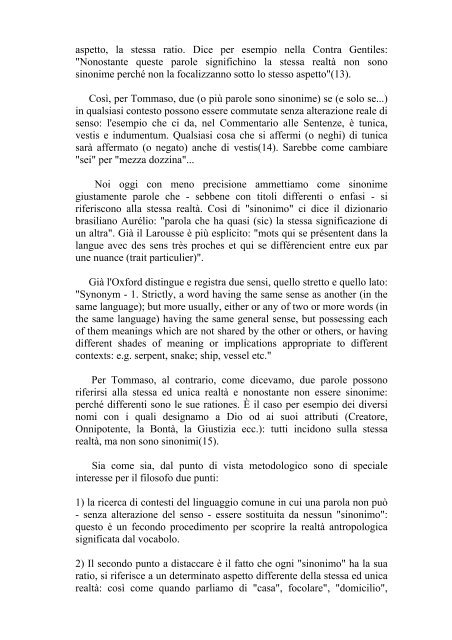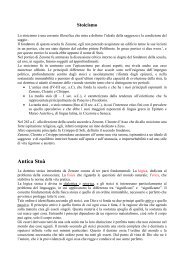La Filosofia di S. Tommaso d'Aquino soggiacente al nostro ...
La Filosofia di S. Tommaso d'Aquino soggiacente al nostro ...
La Filosofia di S. Tommaso d'Aquino soggiacente al nostro ...
Create successful ePaper yourself
Turn your PDF publications into a flip-book with our unique Google optimized e-Paper software.
aspetto, la stessa ratio. Dice per esempio nella Contra Gentiles:<br />
"Nonostante queste parole significhino la stessa re<strong>al</strong>tà non sono<br />
sinonime perché non la foc<strong>al</strong>izzanno sotto lo stesso aspetto"(13).<br />
Così, per <strong>Tommaso</strong>, due (o più parole sono sinonime) se (e solo se...)<br />
in qu<strong>al</strong>siasi contesto possono essere commutate senza <strong>al</strong>terazione re<strong>al</strong>e <strong>di</strong><br />
senso: l'esempio che ci da, nel Commentario <strong>al</strong>le Sentenze, è tunica,<br />
vestis e indumentum. Qu<strong>al</strong>siasi cosa che si affermi (o neghi) <strong>di</strong> tunica<br />
sarà affermato (o negato) anche <strong>di</strong> vestis(14). Sarebbe come cambiare<br />
"sei" per "mezza dozzina"...<br />
Noi oggi con meno precisione ammettiamo come sinonime<br />
giustamente parole che - sebbene con titoli <strong>di</strong>fferenti o enfasi - si<br />
riferiscono <strong>al</strong>la stessa re<strong>al</strong>tà. Così <strong>di</strong> "sinonimo" ci <strong>di</strong>ce il <strong>di</strong>zionario<br />
brasiliano Aurélio: "parola che ha quasi (sic) la stessa significazione <strong>di</strong><br />
un <strong>al</strong>tra". Già il <strong>La</strong>rousse è più esplicito: "mots qui se présentent dans la<br />
langue avec des sens très proches et qui se <strong>di</strong>fférencient entre eux par<br />
une nuance (trait particulier)".<br />
Già l'Oxford <strong>di</strong>stingue e registra due sensi, quello stretto e quello lato:<br />
"Synonym - 1. Strictly, a word having the same sense as another (in the<br />
same language); but more usu<strong>al</strong>ly, either or any of two or more words (in<br />
the same language) having the same gener<strong>al</strong> sense, but possessing each<br />
of them meanings which are not shared by the other or others, or having<br />
<strong>di</strong>fferent shades of meaning or implications appropriate to <strong>di</strong>fferent<br />
contexts: e.g. serpent, snake; ship, vessel etc."<br />
Per <strong>Tommaso</strong>, <strong>al</strong> contrario, come <strong>di</strong>cevamo, due parole possono<br />
riferirsi <strong>al</strong>la stessa ed unica re<strong>al</strong>tà e nonostante non essere sinonime:<br />
perché <strong>di</strong>fferenti sono le sue rationes. È il caso per esempio dei <strong>di</strong>versi<br />
nomi con i qu<strong>al</strong>i designamo a Dio od ai suoi attributi (Creatore,<br />
Onnipotente, la Bontà, la Giustizia ecc.): tutti incidono sulla stessa<br />
re<strong>al</strong>tà, ma non sono sinonimi(15).<br />
Sia come sia, d<strong>al</strong> punto <strong>di</strong> vista metodologico sono <strong>di</strong> speci<strong>al</strong>e<br />
interesse per il filosofo due punti:<br />
1) la ricerca <strong>di</strong> contesti del linguaggio comune in cui una parola non può<br />
- senza <strong>al</strong>terazione del senso - essere sostituita da nessun "sinonimo":<br />
questo è un fecondo proce<strong>di</strong>mento per scoprire la re<strong>al</strong>tà antropologica<br />
significata d<strong>al</strong> vocabolo.<br />
2) Il secondo punto a <strong>di</strong>staccare è il fatto che ogni "sinonimo" ha la sua<br />
ratio, si riferisce a un determinato aspetto <strong>di</strong>fferente della stessa ed unica<br />
re<strong>al</strong>tà: così come quando parliamo <strong>di</strong> "casa", focolare", "domicilio",

















